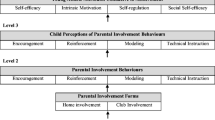Abstract
Individual participation in athletics was examined as a representative achievement-oriented activity in which perceived parental support and pressure influence adolescents' perceptions of themselves and their performance. Adolescent tennis players attending one of the three regional tennis academies indicated their perceptions of the quality of their parents' involvement in their tennis participation, their enjoyment of tennis participation, their self-esteem, and their feelings of burnout associated with tennis participation. Both females and males perceived similar levels of support from their mother and father; however, females perceived greater support from both parents than did males. Males perceived higher levels of pressure from their father than from their mother, whereas females perceived similar levels of pressure from both their father and mother. For both females and males, perceived parental support was positively associated with enjoyment of tennis participation and self-esteem. The findings are discussed as evidence of a general association between adolescents' perceptions of their parents' involvement in their achievement-oriented activities and their enjoyment of such activities and self-perception of abilities associated with those activities.
Similar content being viewed by others
References
Brown, B. A., Frankel, B. G., and Fennell, M. P. (1989). Hugs or shrugs: Parental and peer influence on continuity of involvement in sport by female adolescents.Sex Roles 20: 397–412.
Burton, D., and Martens, R. (1986). Pinned by their own goals: An exploratory investigation into why kids drop out of wrestling.J. Sport Psychol. 8: 1833–197.
Brustad, R. J. (1988). Affective outcomes in competitive youth sport: The influence of intrapersonal and socialization factors.J. Sport Exercise Psychol. 10: 307–321.
Cohn, P. J. (1990). An exploratory study on sources of stress and athlete burnout on youth golf.Sport Psychol. 4: 95–106.
Coopersmith, S. (1967).The Antecedents of Self-Esteem. Freeman, San Francisco.
Corbin, C. B., and Nix, C. (1979). Sex-typing of physical activities and success predictions of children before and after cross-sex competition.J. Sport Psychol. 1: 43–52.
Dunlap, P., and Berne, L. A. (1991). Addressing competitive stress in junior tennis players.J. Phys. Educat. Recreat. Dance 62: 59–63.
Felker, D. W. (1968). Relationship between self-concept, body build, and perception of father's interest in sports in boys.Res. Quart. 39: 513–517.
Feltz, D. L., and Albrecht, R. R. (1986). Psychological implications of competitive running. In Weiss, M., and Gould, D. (eds.),Sport for Children and Youths, The 1984 Olympic Scientific Congress Proceedings (Vol. 10). Human Kinetics, Champaign, IL.
Fine, G. A. (1987).With the Boys: Little League Baseball and Preadolescent Culture. University of Chicago Press, Chicago.
Flohr, J. W. (1987). Parenting the musically gifted: Assumptions and issues.Creative-Child Adult Quart. 12: 62–67.
Gill, D. L., Gross, J. B., and Huddleston, S. (1985). Participation motivation in youth sports.Int. J. Sports Psychol. 14: 1–14.
Gould, D., Horn, T., and Spreemann, J. (1983). Sources of stress in junior elite wrestlers.J. Sport Psychol. 5: 159–171.
Greendorfer, S. L. (1976, September). A social learning approach to female sport involvement. Paper presented at the Annual Convention of the American Psychological Association, Washington, DC.
Greendorfer, S. L., and Lewko, J. H. (1978). The role of family members in sport socialization of children.Res. Quart. 49: 30–36.
Herman, J. L., and Yeh, J. P. (1983). Some effects of parent involvement in schools.Urban Rev. 15: 11–17.
Hewison, J. (1988). The long term effectiveness of parental involvement in reading: A follow-up to the Haringey Reading project.Br. J. Educat. Psychol. 58: 184–190.
Hoffman, L. W. (1972). Early childhood experiences and women's achievement motives.J. Social Issues 28: 129–155.
Hoyle, R. H., and Leff, S. S. (in press). The role of parental involvement in youth sport participation and performance.Adolescence.
Lewko, J. H., and Ewing, M. E. (1980). Sex differences and parental influence in sport involvement of children.J. Sport Psychol. 2: 62–68.
McElroy, M. A. (1982). Consequences of perceived parental pressure on the self-esteem of youth sport participants.Am. Correct. Ther. J. 36: 164–167.
McElroy, M. A. (1983). Parent-child relations and orientations toward sport.Sex Roles, 9: 997–1004.
McElroy, M. A., and Kirkendall, D. R. (1981). Conflict in perceived parent/child sport ability judgments.J. Sport Psychol. 3: 244–247.
Nash, H. L. (1987). Elite child-athletes: How much does victory cost?Phys. Sportsmed. 15: 129–133.
Ogilvie, B. (1979). The child athlete: Psychological implications of participation in sport.Ann. Am. Acad. Polit. Social Sci. 445: 47–58.
Orlick, T. D. (1972).Family sports environment and early sports participation. Paper presented at the Canadian Psychomotor Learning and Sports Psychology Symposium, Waterloo, Ontario.
Orlick, T. D., and Botterill, C. (1975).Every Kid Can Win. Nelson-Hall, Chicago.
Parsons, J. E., Adler, T. F., and Kaczala, C. M. (1982). Socialization of achievement attitudes and beliefs: Parental influences.Child Develop. 53: 310–321.
Passer, M. W. (1982). Children in sport: Participation motives and psychological stress.Quest 33: 231–244.
Reynolds, A. J. (1989). A structural model of first-grade outcomes for an urban, low socioeconomic status, minority population.J. Educ. Psychol. 81: 594–603.
Sapp, M., and Haubenstricker, J. (1978).Motivation for joining and reasons for not continuing in youth sports programs in Michigan. Paper presented at AAHPERD Conference, Kansas City.
Savin-Williams, R. C. (1986). Social interactions of adolescent girls during sports activity: Age and sex-role influences.J. Early Adolesc. 6: 67–75.
Scanlan, T. K., and Lewthwaite, R. (1986). Social psychological aspects of competition for male youth sport participants: Iv. Predictors of enjoyment.J. Sport Psychol. 8: 25–35.
Scanlan, T. K., and Passer, M. W. (1979). Sources of competitive stress in young female athletes.J. Sport Psychol. 1: 151–159.
Scanlan, T. K., Stein, G. L., and Ravizza, K. (1989). An in-depth study of former elite figure skaters: II. Sources of enjoyment.J. Sport Exer. Psychol. 11: 65–83.
Scanlan, T. K., Stein, G. L., and Ravizza, K. (1991). An in-depth study of former elite figure skaters: III. Sources of stress.J. Sport Exer. Psychol. 13: 103–120.
Simon, J. A., and Martens, R. (1979). Children's anxiety in sport and nonsport evaluative activities.J. Sport Psychol. 1: 160–169.
Smith, M. D., Zingale, S. A., and Coleman, J. M. (1978). The influence of adult expectancy/child performance discrepancies upon children's self-concepts.Am. Educat. Res. J. 15: 259–265.
Smith, R. E. (1986). Toward a cognitive-affective model of athletic burnout.J. Sport Psychol. 8: 36–50.
Snyder, E. E., and Spreitzer, E. (1973). Family influence and involvement in sports.Res. Quart. 44: 249–255.
Snyder, E. E., and Spreitzer, E. (1976). Correlates of sport participation among adolescent girls.Res. Quart. 47: 249–255.
Wankel, L. M., and Kreisel, P. S. (1985). Factors underlying enjoyment of youth sports: Sport and age group comparisons.J. Sport Psychol. 7: 51–64.
Watson, G. G. (1975). Sex role socialization and the competitive process inLittle Athletics.Austral. J. Health Phys. Educat. Recreat. 70: 10–21.
Weiss, C. R., and Bailey, B. B. (1985). The influence of older adults' activity selection on their progeny's expectations for their own future.Activ. Adap. Aging 6: 103–114.
Author information
Authors and Affiliations
Additional information
Received M.A. in psychology from the University of North Carolina at Chapel Hill. Research interests include peer relations, aggression and social cognition.
Received Ph.D. in psychology from the University of North Carolina at Chapel Hill. Major research interests are self-concept, attraction, and research methods.
Rights and permissions
About this article
Cite this article
Leff, S.S., Hoyle, R.H. Young athletes' perceptions of parental support and pressure. J Youth Adolescence 24, 187–203 (1995). https://doi.org/10.1007/BF01537149
Received:
Accepted:
Issue Date:
DOI: https://doi.org/10.1007/BF01537149




